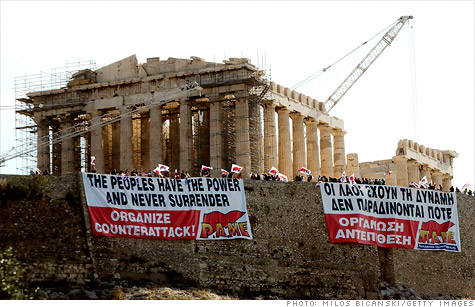Search News

The Greek government approved unpopular austerity measures Wednesday to secure another dose of emergency financial aid.
NEW YORK (CNNMoney) -- Greece has pulled itself back from the brink, by agreeing to a painful austerity package aimed at reducing the country's giant budget deficits.
On Thursday, the Parliament voted to implement those unpopular reforms. The vote set the stage for the nation to secure the final $17 billion of a $156 billion international relief package.
The latest cash infusion means Greece will be able to stave off an immediate default and pay its bills for the next three months.
But Greece is not out of the woods. The country still needs to put the unpopular reforms into practice, negotiate with creditors and privatize big public institutions.
Passage of the austerity plan "will certainly give some short-term relief to markets," said IHS Global senior economist Diego Iscaro. "But concerns about the long-term feasibility of Greece's fiscal plans still remain in place."
Greece is now expected to begin negotiations with the European Union and International Monetary Fund for another bailout, said Wolfango Piccoli, a director at the Eurasia Group in London.
The next round of emergency aid is expected to range between $172 billion and $216 billion, which would cover Greece's expenses through 2014, he said.
As with the previous deal, the new package will come with conditions. The terms are expected to include some concessions by Greece's creditors and the transfer of state assets to the private sector.
But providing more short-term support for Greece "is just kicking the can down the road," Piccoli said.
Officials in Europe are hoping to keep Greece solvent long enough to allow other troubled European nations to strengthen and put pressure on Greece to enact the painful reforms passed Wednesday.
At the same time, the European Union is working with Greece's main creditors -- French and German banks -- to roll over some of the nation's debt into longer-term bonds.
"It's unclear how that will be done, though there seems to be some willingness there," on the part of the banks, said Piccoli. "But that's just another measure to gain time, it doesn't diminish the amount of debt that Greece will be left with."
The bottom line is that Greece's ability to repay its debts remains in question.
"For all economic intents and purposes, Greece has already defaulted," said Sandeep Dahiya, professor of finance at Georgetown's McDonough School of Business. "There's no way Greece can repay all the money it owes."
The big worry is that other debt-laden nations in Europe -- particularly Ireland, Portugal, Italy and Spain -- would be dragged down if Greece were to default in a disorderly way.
But the threat to the U.S. economy, for now, remains remote.
That's mainly because U.S. banks have relatively little Greek debt on their books and the financial markets have largely priced in Greece's fiscal problems, which have been playing out for over a year.
Nevertheless, the situation remains highly uncertain.
"We're still not sure how much exposure there is," said Gus Faucher, an economist at Moody's Analytics. "There is certainly the potential for a big problem in the U.S. if Greece were to default unilaterally."
While he believes that's unlikely, Faucher said an outright default by Greece could cause a financial shock similar to the one that occurred after Lehman Brothers collapsed in 2008.
The investment bank's implosion roiled global financial markets and caused a severe credit crisis.
Analysts say U.S. money market funds, which hold an estimated 40% of their assets in various forms of European debt, would be the most vulnerable in such a scenario.
Ben Bernanke, chairman of the U.S. Federal Reserve, said last week that the central bank is looking into how exposed U.S. money market funds are to Greece. He acknowledged that the indirect exposure could be "very substantial," but sounded hopeful that the worst won't come to pass.
In addition, some U.S. investment banks and insurance companies could be on the hook if they own credit default swaps linked to European debt.
These complex derivatives, which crippled US insurance giant AIG after Lehman fell, could also yield big profits for investors betting against Europe.
However, the market for credit default swaps is opaque and analysts say it's impossible to pinpoint how exposed U.S. institutions may be to them. ![]()
| Overnight Avg Rate | Latest | Change | Last Week |
|---|---|---|---|
| 30 yr fixed | 3.80% | 3.88% | |
| 15 yr fixed | 3.20% | 3.23% | |
| 5/1 ARM | 3.84% | 3.88% | |
| 30 yr refi | 3.82% | 3.93% | |
| 15 yr refi | 3.20% | 3.23% |
Today's featured rates: